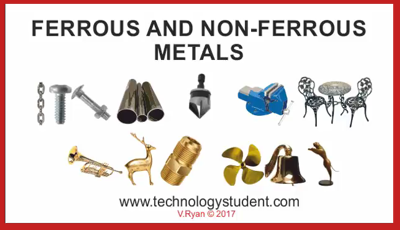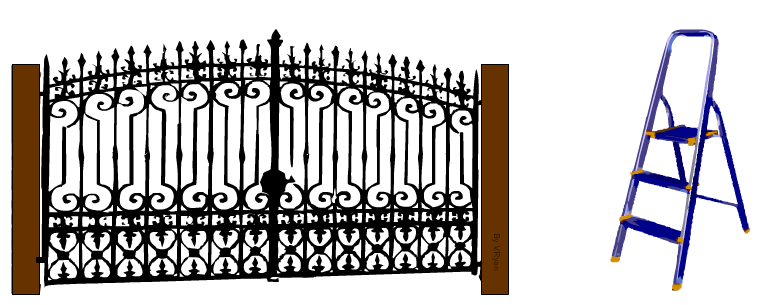| CLICK HERE FOR INDEX PAGE |
| FERROUS AND NON-FERROUS METALS (QUESTIONS) |
| V. Ryan © 2012-2017 |
| PDF FILE - CLICK HERE FOR PRINTABLE WORKSHEET |
| YouTube Video - Introduction to Ferrous and Non-Ferrous Metals. |
 |
|
FERROUS METALS - Metals that contain
iron. |
| 1. Complete the table of ferrous and non-ferrous metals by adding four examples of each. |
 |
| 2. Choose a FERROUS and NON-FERROUS metal from your completed table. Describe a suitable use for each metal and explain why each is suitable. |
| FERROUS METAL: __________________________________________________________ |
| USE: |
| WHY SUITABLE: |
| NON-FERROUS METAL: __________________________________________________________ |
| USE: |
| WHY SUITABLE: |
| 3. Sketch each product: |
| POSSIBLE ANSWERS |
| 1. Complete the table of ferrous and non-ferrous metals by adding four examples of each. |
 |
| 2. Choose a FERROUS and NON-FERROUS metal from your completed table. Describe a suitable use for each metal and explain why each is suitable. |
| FERROUS METAL: Wrought Iron |
| USE: The manufacture of ornamental gates |
| WHY SUITABLE: |
| Wrought Iron is tough, ductile and resistant to rusting. It can be formed and shaped (twisted and scrolled) especially when heated to red heat. Wrought iron can be welded, so that individual components can be joined to form complicated ornamental gates. It can be painted with a range of paints. It is very strong. |
| NON-FERROUS METAL: Aluminium |
| USE: Ladders |
| WHY SUITABLE: |
| Aluminium ladders are light and consequently easy to carry. Aluminium can be extruded to form strong sections, ideal for lightweight products such as ladders. It resists rust and corrosion and can even be welded. It can be machined quite easily, as it is soft compared to steel. Aluminium is ductile and malleable, which means it can be shaped and formed more easily, than more resistant metals such as steel. |
| 3. Sketch each product: |
 |
| CLICK HERE FOR RESISTANT MATERIALS INDEX PAGE |